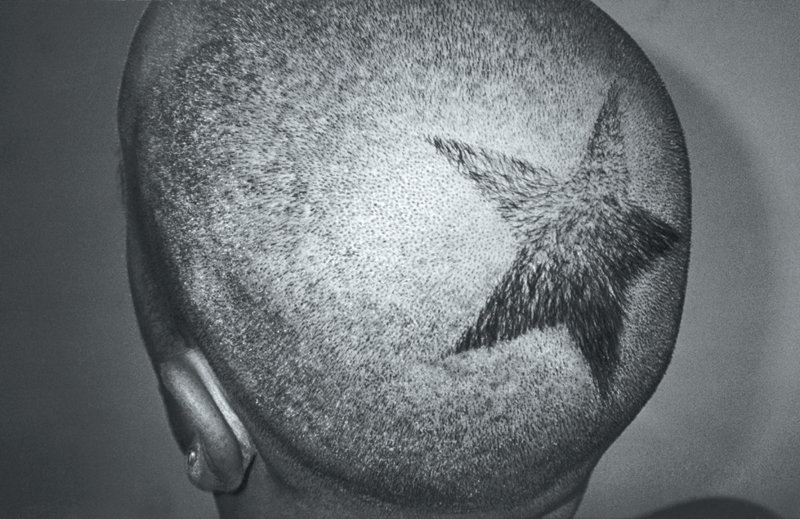site under construction
this web site is under construction. opening in 2017
sajt u izradi
ovaj veb-sajt je u izradi. otvaranje u 2017.
download section | preuzimanje dokumenata
cv & bibliography
strategies of excess | 2013
life as such | 2015
gerald matt | interview (en/de)| 2006
on normality | artforum | 2005
When Uroš Djurić gets into a taxi in Belgrade, he is greeted like a pop star. After all, the retired punk enjoys a
glamorous image whose fascination reaches far beyond the alternative art scene of the Serbian capital.
In 1994, the movie actor, publisher of underground comics, graphic artist, DJ in the club "The Hole" and designer of
pertinent radio shows for the Belgrade network B92 published the "Autonomism Manifesto" together with Stevan Markuš,
thus establishing the "personal principle" as the chief motivation for the production of art at the fringe of a society
in which bankers, politicians, lawbreakers, and war criminals were considered heroes. "The most important criteria for
entering their club," Djurić recounts, "was to join them in their game." He developed "The Populist Project", pointing out
the interaction between the individual and the star system by presenting himself on the cover of an imaginary magazine
entitled "Hometown Boys" as a player of the most prominent European soccer clubs and as a pioneer with a red neckerchief
amidst the most famous protagonists of the Eastern European art scene.
When Uroš Djurić paints, he does so in the reassuring awareness of being a conceptual artist. Self-portraits with a
guitar are an obvious theme for him, since he is the proud owner of the most expensive Fender Telecaster, featuring a
natural wooden body and a rosewood neck – a classic among electric guitars. The present painting's title alone – a
well-meant piece of advice from Germany as the country of the economic miracle – already suggests that Djurić samples
styles and contexts and cherishes the irony-clad genre of a true intellectual whose success derives from his –
occasionally traumatic – affiliation with a minority on the one hand and his belonging to an elite on the other.
It is thus not surprising that Djurić was getting along well with Germany's legendary "enfant terrible" Martin
Kippenberger. In appropriating Kippi's genre of drawing on hotel stationary, he underscores his admiration by expanding
the format. The text quotes an icon from the international antifascist song repertory. In the personal branding conceived
by Kippenberger/Djurić, the last line, which in the original is "we are the workers of Vienna," has logically been changed
to "we are the workers of Belgrade + Cologne."
Brigitte Huck
evn collection 2006-2011, EVN AG (ed.), Verlag der Buchhandlung Walther König Cologne 2011, page 113
Wenn Uroš Djurić in Belgrad in ein Taxi steigt, wird er wie ein Popstar begrüßt. Schließlich verfügt der emeritierte
Punk über einen schillernden Glamourfaktor, der über das alternative Künstlermilieu der serbischen Hauptstadt
hinausreicht. Im "Manifest des Autonomismus" etablierte der Filmschauspieler, Verleger von Undergroundcomics, Grafiker,
DJ im Club „The Hole“ und Gestalter einschlägiger Radioshows für den Belgrader Sender B92 gemeinsam mit Stevan Markuš 1994
das „persönliche Prinzip“ als Hauptantriebskraft für die Produktion von Kunst am Rande einer Gesellschaft, in der Banker,
Politiker, Kriminelle und Kriegsverbrecher die Helden waren. „Das wichtigste Kriterium zum Eintritt in ihren Klub“,
erzählt Djurić, „war, an ihrem Spiel teilzunehmen.“ Er entwickelt "The Populist Project" und macht die Interaktionen
zwischen Individuum und Starsystem deutlich: Er präsentiert sich auf dem Cover eines imaginären Magazins namens "Hometown
Boys" als Spieler der prominentesten europäischen Fußballclubs und als Pionier mit rotem Halstuch in Gesellschaft der
bekanntesten Vertreter des osteuropäischen Kunstbetriebs.
Wenn Uroš Djurić malt, dann in dem beruhigenden Bewusstsein, ein Konzeptkünstler zu sein. Selbstporträts mit Gitarre sind
ein Thema für den stolzen Besitzer der teuersten Fender Telecaster mit Naturholz-Body und Hals aus Rosenholz – eines
Klassikers unter den E-Gitarren. Allein der Titel des Gemäldes – ein guter Ratschlag aus dem deutschen
Wirtschaftswunderland – weist bereits darauf hin, dass Djurić Stile und Kontexte sampelt und das ironisch unterfütterte
Genre eines wahren Intellektuellen pflegt, dessen Erfolg aus der – gelegentlich traumatischen – Zugehörigkeit zu einer
Minderheit auf der einen und einer Elite auf der anderen Seite erwächst.
So wundert es nicht weiter, dass Djurić mit Deutschlands legendärem Enfant terrible Martin Kippenberger gut
zurechtgekommen ist. In seiner Aneignung von Kippis Genre von Zeichnungen auf Hotelpapier macht er seine Verehrung
durch Formatexpansion deutlich. Zitiert wird der Text einer Ikone des internationalen antifaschistischen Liedrepertoires.
Die letzte Zeile, die im Original „wir sind die Arbeiter von Wien“ lautet, wird im Personal Branding von
Kippenberger/Djurić zum naheliegenden „wir sind die Arbeiter von Beograd + Köln“.
Brigitte Huck
Aus: evn collection 2006-2011, EVN AG (Hrsg.), Verlag der Buchhandlung Walther König Köln 2011, S. 112


